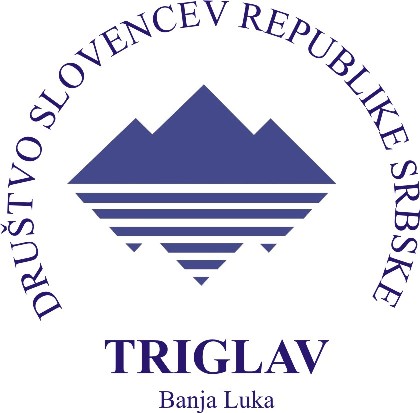Following the “Atlas of European Lyrics”, the Association of the Slovenians of the Republic of Srpska “Triglav” and Association of Literary Translators “Kuća poezije” from Banja Luka published an anthology of stories “Legacy of European Story“ by author Zdravko Kecman.
This anthology contains stories of peoples who lived in the territory of Bosnia and Herzegovina, mainly Republic of Srpska, whose descendants still live in the area preserving culture, language, literature. Anthology encompasses the following languages and literature: Polish, Ukrainian, Italian, German, Slovenian, Macedonian, Czech, Slovak, etc.
Anthology was presented on 23 September 2016 in the Cultural Centre Banski dvor as part of Days of Cultural Creativity of National Minorities. Author Zdravko Kecman pointed out that that was the promotion of literatures of peoples living and creating in the Republic of Srpska and BiH. In his concise introduction, the author mentioned some important facts about each literature, story and language. The anthology is a rather extensive literary work the content of which includes several languages. It contains the works by our famous translators: Biserka Rajačić, Stevan Tontić, Adnana Karahasanović Zeljković, Žarko Milenić, but also some young ones: Minja Golubović, Nataša Kuzmanović, etc.
In his review Milenko Stojičić, among other things, wrote: “...the importance of the anthology is that in addition to the known authors (Solzhenitsyn, Schulz, Gombrowicz, Mrožek, Buzzati, Baricco, Kunze, and Kupriyanov), it also included authors who are in the shadow of big (selected) authors, but passed their ‘literary exam’ by their interesting stories”. In her introduction speech, Aleksandra Čvorović spoke about the story as the phenomenon existing in each literature; being both individual and universal; there are differences but also similarities among stories of different peoples.
Other represented participants read some of their texts and also underlined the specific characteristics of the language in which they write. Ilješ Feher, Hungarian translator pointed out the specific nature of own language, not being similar to any other European language except perhaps Finnish being in the same language group but again different from it as well. Hedina Tahirović Sijerčić, a poet from Sarajevo and an activist for the position and rights of Roma minority said there were no translator from Roma language in a classical sense but mere authors translate into languages used in the country where they live; Polish Roma into Polish language, German into German, English into English, Russian into Russian, Serbian into Serbian and other languages. Of course, they often write in the language used in the country where they live.
Promotion was also diversified by the performance of pianist Hajrudin Muhić. Some of the authors also read their texts: Ranko Risojević, Slobodan Bošković, as well as translators Zdravko Kecman, Ana Marjanović, etc. Legacy the book brings is special as it comes from countries of national minorities living in this area, who moved here during the Austro-Hungarian Empire and two Yugoslavias.


















